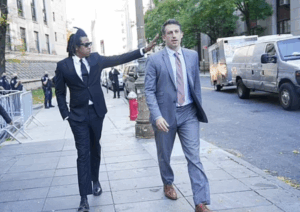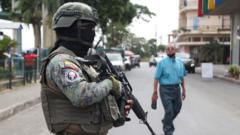President Donald Trump has declared a "public safety emergency" in Washington DC, mobilizing 800 National Guard troops to assist local law enforcement in response to what he describes as a growing crime wave. This decision, announced during a White House news conference, has sparked a contentious debate among city officials. While Trump insists on the need for immediate action, Mayor Muriel Bowser staunchly refutes claims of lawlessness, pointing to declining crime rates and improved local conditions.
Trump Activates National Guard in Washington, Vows to Tackle Crime and Homelessness

Trump Activates National Guard in Washington, Vows to Tackle Crime and Homelessness
In a bold move, President Trump has deployed the National Guard to Washington DC amid claims of heightened crime and homelessness, asserting a need for federal intervention in the capital.
The National Guard's deployment, a historic move under the District of Columbia Home Rule Act, aims to address increasing fears of violence and homelessness in the city. Despite Trump's assertions that the capital is overrun by gangs and criminals, local data suggests that violent crime is currently at a 30-year low. Opposition voices, including city officials and community groups, have expressed concern over the potential consequences of federal control. Meanwhile, protests have emerged, reflecting deep divisions over the president's approach to addressing public safety in the nation’s capital.
The article text:
President Donald Trump has taken a decisive step in Washington DC, declaring a "public safety emergency" and deploying the National Guard to tackle crime and homelessness in the city. This announcement, made on Monday, sees 800 National Guard troops sent to bolster the existing law enforcement presence, which has become a point of contention between the president and city officials.
Trump's move has been framed as a necessary response to a "situation of complete and total lawlessness," as he described it during a White House press conference. With the Mayor of Washington DC, Muriel Bowser, pushing back against Trump’s narrative, she emphasized that while crime did spike in 2023, statistics show a notable decrease this year, with violent crime at a remarkably low rate compared to previous decades. “We are not experiencing a crime spike,” Bowser declared during an interview, countering Trump’s assertions.
During the press conference, the president asserted that the city had fallen into disarray, claiming it was "taken over by violent gangs and bloodthirsty criminals," and suggesting that homelessness had escalated the crisis. He pledged to restore safety and order to the capital, referencing the city's image as being a reflection of national dignity. “If our capital is dirty, our whole country is dirty,” Trump said.
Regarding the National Guard's role, approximately 100-200 troops would be actively supporting local law enforcement at any given moment. This action is made possible under the District of Columbia Home Rule Act, which allows the president to seize control of the police department in emergency situations. Critics, including Mayor Bowser, have highlighted that the current conditions in the city do not warrant such federal oversight. She reiterated that we have laws that govern such federal involvement in local matters, suggesting that the present situation does not meet those criteria.
Local groups have expressed that homelessness has been addressed more effectively in recent years. Ralph Boyd from So Others Might Eat indicated that homelessness among individuals has decreased by nearly 20% compared to five years ago, criticizing Trump’s proposed plan to relocate individuals rather than providing lasting solutions.
Outside the White House, protests led by concerned citizens echoed sentiments of resistance to what they perceive as a federal overreach, chanting slogans such as "hands off DC" and calling out for the protection of local governance. Voices at these protests allege that Trump's actions are less about safety and more about exerting control over the city.
The deployment comes on the heels of social media posts from Trump highlighting his grievances regarding the management of crime and homelessness by Washington DC's Democratic leadership. Moreover, key incidents of violence against federal employees have further fueled his rhetoric on the need for stringent governmental intervention in ensuring the safety of both residents and visitors.
This mobilization marks the first National Guard activation in DC since the Capitol riot in 2021, signaling a significant federal engagement in local law enforcement dynamics that could shape the future governance of the capital.
The article text:
President Donald Trump has taken a decisive step in Washington DC, declaring a "public safety emergency" and deploying the National Guard to tackle crime and homelessness in the city. This announcement, made on Monday, sees 800 National Guard troops sent to bolster the existing law enforcement presence, which has become a point of contention between the president and city officials.
Trump's move has been framed as a necessary response to a "situation of complete and total lawlessness," as he described it during a White House press conference. With the Mayor of Washington DC, Muriel Bowser, pushing back against Trump’s narrative, she emphasized that while crime did spike in 2023, statistics show a notable decrease this year, with violent crime at a remarkably low rate compared to previous decades. “We are not experiencing a crime spike,” Bowser declared during an interview, countering Trump’s assertions.
During the press conference, the president asserted that the city had fallen into disarray, claiming it was "taken over by violent gangs and bloodthirsty criminals," and suggesting that homelessness had escalated the crisis. He pledged to restore safety and order to the capital, referencing the city's image as being a reflection of national dignity. “If our capital is dirty, our whole country is dirty,” Trump said.
Regarding the National Guard's role, approximately 100-200 troops would be actively supporting local law enforcement at any given moment. This action is made possible under the District of Columbia Home Rule Act, which allows the president to seize control of the police department in emergency situations. Critics, including Mayor Bowser, have highlighted that the current conditions in the city do not warrant such federal oversight. She reiterated that we have laws that govern such federal involvement in local matters, suggesting that the present situation does not meet those criteria.
Local groups have expressed that homelessness has been addressed more effectively in recent years. Ralph Boyd from So Others Might Eat indicated that homelessness among individuals has decreased by nearly 20% compared to five years ago, criticizing Trump’s proposed plan to relocate individuals rather than providing lasting solutions.
Outside the White House, protests led by concerned citizens echoed sentiments of resistance to what they perceive as a federal overreach, chanting slogans such as "hands off DC" and calling out for the protection of local governance. Voices at these protests allege that Trump's actions are less about safety and more about exerting control over the city.
The deployment comes on the heels of social media posts from Trump highlighting his grievances regarding the management of crime and homelessness by Washington DC's Democratic leadership. Moreover, key incidents of violence against federal employees have further fueled his rhetoric on the need for stringent governmental intervention in ensuring the safety of both residents and visitors.
This mobilization marks the first National Guard activation in DC since the Capitol riot in 2021, signaling a significant federal engagement in local law enforcement dynamics that could shape the future governance of the capital.






















